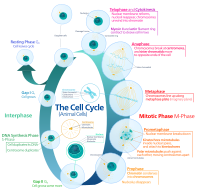
Photo from wikipedia
Asymmetrically dividing stem cells often show asymmetric behavior of the mother versus daughter centrosomes, whereby the self-renewing stem cell selectively inherits the mother or daughter centrosome. Although the asymmetric centrosome… Click to show full abstract
Asymmetrically dividing stem cells often show asymmetric behavior of the mother versus daughter centrosomes, whereby the self-renewing stem cell selectively inherits the mother or daughter centrosome. Although the asymmetric centrosome behavior is widely conserved, its biological significance remains largely unclear. Here, we show that Alms1a, a Drosophila homolog of the human ciliopathy gene Alstrom syndrome, is enriched on the mother centrosome in Drosophila male germline stem cells (GSCs). Depletion of alms1a in GSCs, but not in differentiating germ cells, results in rapid loss of centrosomes due to a failure in daughter centriole duplication, suggesting that Alms1a has a stem-cell-specific function in centrosome duplication. Alms1a interacts with Sak/Plk4, a critical regulator of centriole duplication, more strongly at the GSC mother centrosome, further supporting Alms1a’s unique role in GSCs. Our results begin to reveal the unique regulation of stem cell centrosomes that may contribute to asymmetric stem cell divisions.
Journal Title: eLife
Year Published: 2020
Link to full text (if available)
Share on Social Media: Sign Up to like & get
recommendations!